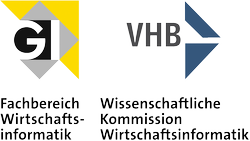Track 6: Business Process and Service Management
Establishing service-oriented business models successfully requires the conceptual design and implementation of suitable business processes for the development, marketing and delivery of services. In order to fulfill customer demands, resources and core competencies need to be integrated. This is ensured by an integration of the business processes both within and outside of an organization. This track provides a forum for analyzing the applicability of business process management methods for supporting service-oriented business models as well as for developing these methods further.
From a service management perspective, requirements of service-oriented business models for the analysis and the design of business processes are identified. Besides cross-functional integration within service-oriented organizations, aspects of a company-wide integration are considered as well. Within this context, further issues concerning the integration strategy, the division of work and the process-related design arise.
From a business process management perspective, methods and models are developed which fulfill these requirements regarding strategic, analytical, design- and implementation-oriented aspects. Thereby, they contribute to the further establishment of service-oriented business models. Here, questions concerning the comprehensive, integrated view and the implementation and establishment of the business process management life cycle play a role.
Topics
Service science management and engineering (SSME)
Requirements for business processes in service-oriented enterprises
Distribution and integration of business processes in service networks
Service identification and process model standardization
Efficient management of service and process variants
Strategic components and aspects of business process management
Cultural impacts on the design of business process management frameworks
Methods and tools for service-oriented business process modeling and analysis
Characteristics and challenges of service-oriented implementation of business processes
Track Chairs
Prof. Dr. Jörg Becker, WWU Münster, Germany
Prof. Dr. Jan Mendling, Wirtschaftsuniversität Wien, Austria
Program Committee
Dr. Daniel Beverungen, WWU Münster, Germany
Prof. Dr. Tilo Böhmann, University Hamburg, Germany
Prof. Dr. Peter Buxmann, TU Darmstadt, Germany
Prof. Dr. Helmut Krcmar, TU München, Germany
Prof. Dr. Christine Legner, Université de Lausanne, Switzerland
Prof. Dr. Susanne Leist, University Regensburg, Germany
Prof. Dr. Peter Loos, University Saarbrücken, Germany
Dr. Oliver Müller, University Lichtenstein, Lichtenstein
Prof. Dr. Markus Nüttgens, University Hamburg, Germany
Prof. Dr. Andreas Oberweis, Karlsruhe Institute of Technology, Germany
Dr. Jens Pöppelbuß, IFIB, Universität Bremen, Germany
Dr. Michael Räckers, WWU Münster, Germany
Prof. Dr. Jan Recker, Queensland University of Technology, Australia
Prof. Dr. Manfred Reichert, University Ulm, Germany
Prof. Dr. Stefanie Rinderle-Ma, University Vienna, Austria
Prof. Dr. Michael Rosemann, Queensland University of Technology, Australia
Prof. Dr. Gerhard Satzger, KIT, Germany
Prof. Dr. Oliver Thomas, University Osnabrück, Germany
Prof. Dr. Jan vom Brocke, University Liechtenstein, Liechtenstein
Prof. Dr. Mathias Weske, Hasso Plattner Institute, University Potsdam, Germany
Prof. Dr. Michael zur Muehlen, Stevens Institute of Technology, United States














